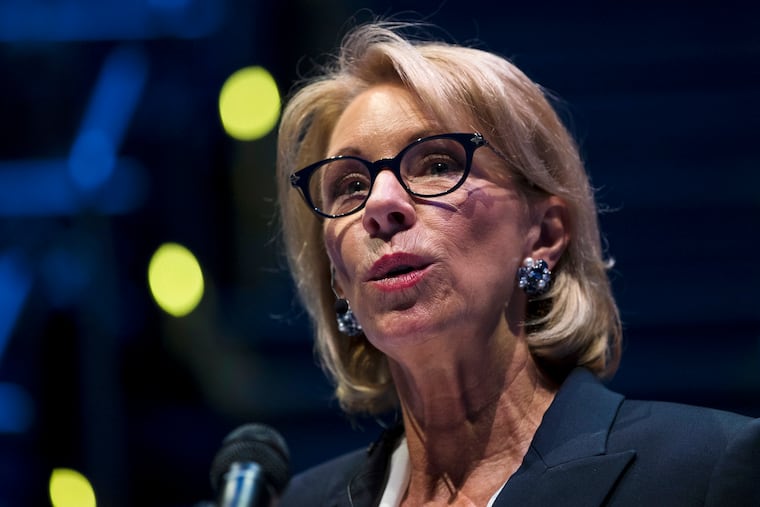Trump’s safety panel seeks to revoke school discipline rules
President Donald Trump's school safety commission is proposing a rollback of Obama-era guidance that critics say discouraged schools from reporting violent students to police

President Donald Trump's school safety commission on Tuesday called for a rollback of an Obama-era policy that was meant to curb racial disparities in school discipline but that critics say left schools afraid to take action against potentially dangerous students.
The panel, led by Education Secretary Betsy DeVos, made the recommendation in a report that lays out dozens of suggestions to improve safety in America's schools. Trump created the commission in March following a Parkland, Florida, school shooting that killed 17 students and staff members.
The report covers areas ranging from mental health and cyberbullying to the regulation of guns and violent video games. On the question of whether schools should arm teachers and other employees, the panel said it should be left to states and schools to decide, but the panel noted that schools can use certain federal grants for firearms training.
"Our conclusions in this report do not impose one-size-fits-all solutions for everyone everywhere," DeVos said in a call with reporters. "Local problems need local solutions. This report seeks to identify options that policymakers should explore."
The commission gave the report to Trump, who planned to talk about it later Tuesday.
Among the chief proposals is a rollback of 2014 guidance urging schools not to suspend, expel or report students to police except in the most extreme cases. Instead, the guidance calls for a variety of "restorative justice" remedies that don't remove students from the classroom.
President Barack Obama's administration issued the guidance after finding that black students were more than three times as likely as their white peers to be suspended or expelled. The guidance warns that schools suspected of discrimination — even if it is unintentional — can face investigations and risk losing federal funding.
But the policy came under scrutiny following the Parkland shooting, with some conservatives suggesting it discouraged school officials from reporting the shooter's past behavioral problems to police. Florida Republican Sen. Marco Rubio, one of the most vocal critics, urged DeVos to find a better balance between discipline and school safety.
In its report, the commission says the policy was well-intentioned but "may have paradoxically contributed to making schools less safe." It calls for a rollback, saying disciplinary decisions should be left to school officials. It said the Justice Department should still investigate intentional discrimination but not the unintentional cases that are barred under the 2014 policy.
The commission's proposal was praised by some conservative groups but drew harsh criticism from some activist groups.
Dmitri Holtzman, director of education justice campaigns for the Center for Popular Democracy, said the proposal sends "a clear message to millions of Black, Brown, Immigrant, LGBTQ and Transgender students that the Federal Government is turning its back on them instead of proactively protecting their fundamental rights."
Along with DeVos, the safety commission includes leaders of the departments of Justice, Health and Human Services and Homeland Security. They issued their findings after more than a dozen meetings with teachers, parents, students, mental health experts, police and survivors of school shootings.
While the report doesn't encourage schools to arm teachers or staff, it says they're allowed to, and it points them to a Justice Department grant that can be used for training. Still, the group underscored that having a police officer who works in the school is the best option to respond to violence.
Among its other proposals, the commission urged states to adopt laws allowing "extreme risk protection orders," or court orders that temporarily restrict access to firearms for people who are found to pose risks to themselves or others. The group recommended against raising the minimum age to buy a firearm, generally 18 in most states, saying there's no evidence it would reduce killings.
___
Follow Collin Binkley on Twitter at https://twitter.com/cbinkley